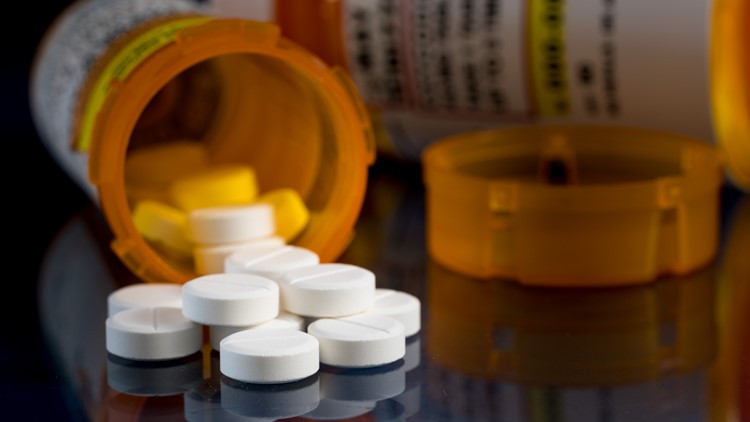AUGUSTA, Maine — The Office of the Attorney General (OAG) and the Office of the Chief Medical Examiner (OCME) released Maine's annual drug death report Wednesday, showing an increase in overdose deaths in the state in 2020.
In 2020, 504 Mainers died from drug overdoses—an increase of 33 percent compared to the 380 drug overdose deaths in 2019, according to the report.
The rise over 2019 was largely driven by a 33-percent rise in deaths due to nonpharmaceutical drugs, primarily fentanyl, increasingly combined with methamphetamine or cocaine, according to the report.
The report said of the 504 deaths, 457 (91 percent) were accidental overdoses, 33 (6 percent) were suicidal overdoses, and 14 (3 percent) were certified as undetermined manner of death.
2020 was a particularly difficult year for many people who struggle with addiction because of the isolation caused by lockdowns implemented due to the COVID-19 pandemic. In his written response to the report, Attorney General Aaron Frey said "more work needs to be done to fully understand the impact of the pandemic on drug overdose deaths."
"It is important to recognize and mourn those who have died, and we must consider the data behind these deaths, particularly as it relates to prevalence of fentanyl in overdoses," Frey said in his response to the report. "The pandemic has impacted efforts and contributed to these nationwide trends, but more work needs to be done to fully understand the impact of the pandemic on drug overdose deaths. We must act with continued urgency to ensure that all appropriate systems are directing those caught up in the epidemic to resources that will assist in rehabilitation.”
The report said, in part, "We are doing more research to explore whether characteristics of the pandemic, such as isolation, access to medical services, or to alterations in opioid availability with associated fluctuations in opioid tolerance may have differentially exposed people more to the lethal effects of illicit fentanyl compared to other drug less lethal categories."
In Gov. Janet Mills' statement in response to the report, she noted the impact the pandemic has had on many Maine people.
“The COVID-19 pandemic has been difficult in many ways, and this is yet another example of how it has hurt our state and our people. My heart breaks for every single life lost to a drug overdose. Those we lost are friends, loved ones and community members — people with meaningful lives,” Mills said. “As we reflect upon those we lost, let us honor their lives by rededicating ourselves to ending the scourge of substance disorder and overdose deaths in our state, preventing addiction in the first place, and expanding access to treatment and recovery options. With this new panel, we can learn a great deal more, adapt policies in an agile manner to meet this ever-changing threat, and save the lives of Maine people.”
On Tuesday, Mills signed into law a bill that establishes the Accidental Drug Overdose Death Review Panel. The panel will review a subset of deaths caused by accidental drug overdoses and recommend to state, county, and local agencies methods of preventing these types of deaths. These methods of prevention include modification or enactment of laws, rules, policies, and procedures, according to the Mills administration.
Here are some other drug-specific takeaways noted in the report:
- The average cause of death involved three drugs.
- Most deaths (407, 81%) were caused by two or more drugs. This is a 26% increase over 2019 (323, 85%), and slightly less in percentage.
- Deaths caused by opioids totaled 417 (83%), a 31% increase in number compared to 2019 (318, 84%), but about the same proportion.
- Deaths caused by nonpharmaceutical opioids such as illicit fentanyl and heroin totaled 346 (69% of all deaths and 83% of opioid deaths), a 29% increase in number compared to 2019 levels (268, 70% of all deaths and 84% of opioid deaths), but about the same proportion.
- Deaths caused by pharmaceutical opioids totaled 118 (23% of all drug deaths and 28% of opioid deaths), a 23% increase in number compared to 2019 (96, 25% of all drug deaths and 30% of opioid deaths), but about the same proportion.
- Deaths caused by pharmaceutical benzodiazepines totaled 84 (17%), the same number as in 2019 84 (22%), but 5% lower in proportion.
- Fentanyl and its analogs caused 336 deaths (67% of all drug deaths and 81% of opioid deaths), a 30% increase in number compared to 2019 (259, 68% of all drug deaths and 81% of opioid deaths), but about the same proportion.
- Heroin caused 57 deaths (11% of all drug deaths and 18% of opioid deaths), slightly fewer in number and proportion of all drug deaths and about the same proportion of opioid deaths as in 2019 (61, 16% of all drug deaths and 19% of opioid deaths).
- Cocaine-involved deaths totaled 118 (23% of drug deaths), a 7% increase in number compared to 2019 (110, 29% of drug deaths), but a lower proportion. Cocaine is a cointoxicant in 29% of fentanyl deaths and 30% of heroin deaths.
- Methamphetamine-involved deaths totaled 99 (20% of all deaths), a 111% increase in number compared to 2019 (47, 12% of all deaths), and an 8% increase in percentage.
"No single intervention will solve this crisis. I am hopeful that initiatives underway in the Mills Administration, such as the MaineMOM Initiative highlighted in the March 2021 report, will lead to positive outcomes," Frey said in his response to the report. "It is incumbent on leaders from all across Maine to come to the table to pursue solutions which will save lives.”
"We remain committed to doing everything we can to help Maine people with substance use disorder access treatment, and most important, keep them alive," Gordon Smith, Maine's director of opioid response, said in a release. "The OPTIONS initiative is now connecting with Maine people in 14 counties to help prevent overdoses and encourage recovery. The new overdose review panel created by Governor Mills, and new data available from the Office of the Attorney General and the University of Maine, will offer greater insight into the opioid epidemic and how we should respond. As we continue to fight this epidemic, which is more lethal than ever due to powerful drugs like fentanyl and the number of people using alone, we will use every avenue available to support all Maine people, families and communities affected by it."
READ THE FULL 2020 REPORT
The OAG and OCME also released Maine's drug death reports for March 2021 and April 2021 on Wednesday. The 2020 average for drug deaths per month was 42, but the range extended from 34 to 53. Both March 2021 and April 2021 exceeded 42 deaths, according to the reports released Wednesday.
The March 2021 total of 53 fatal drug overdoses consists of 30 confirmed drug deaths and 23 suspected drug deaths, according to the report.
The April 2021 total of 48 fatal drug overdoses consists of 10 confirmed drug deaths and 38 suspected drug deaths, according to the report.
READ THE FULL MARCH 2021 AND APRIL 2021 REPORTS
Through StrengthenME, the Maine Department of Health and Human Services is collaborating with a coalition of community organizations and agencies to offer free stress management, wellness, and resiliency resources to anyone experiencing emotional challenges in response to the pandemic.
If you or someone you know is looking for support, call 207-221-8198, seven days a week, from 8 a.m. to 8 p.m. StrengthenME is free, confidential, anonymous, and available to anyone in Maine, according to the Mills administration.
For information about substance use disorder support and resources, call 211, text your zip code to 898-211, email info@211Maine.org, visit the Maine 211 website, or visit the DHHS Office of Behavioral Health’s resource page.
EDITOR'S NOTE: The video below aired Jan. 14, 2021.



